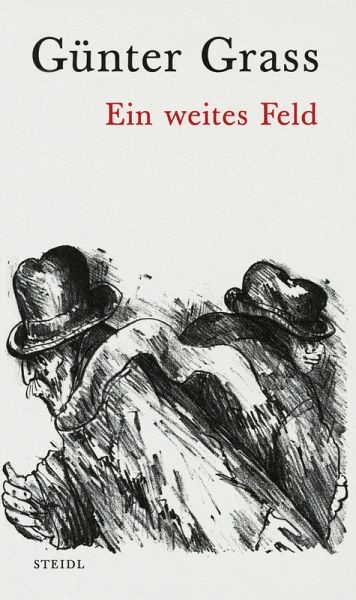The novelist, poet, artist and political activist Günter Grass (1927-2015) has been the focus of a number of publication and editorial projects, public-facing events and conferences, as well as post-doctoral and postgraduate work in the CCGC.
We are pleased that the Modern Humanities Research Association is once again in 2019-20 supporting the preparation of a volume of the complete works through its Research Associate scheme. The volume in question is Grass’s major novel of reunification Ein weites Feld (1995, translated by Krishna Winston as Too far Afield) which is being edited by Dr Susanna Brogi, who is attached to the University of Erlangen and is currently the director of the Deutsche Kunstarchiv am Germanischen Nationalmuseum (The Art Archive at the National German Museum).

Background
Calls for a novel of the ‘Wende’ which would give literary shape to the epochal changes inaugurated by the Fall of the Berlin Wall in November 1989 began to ring out in the literary sections of the German press before the Wall itself was demolished. Who, some commentators asked, should write this novel if not Günter Grass, whose epic fictions demonstrated such a profound knowledge of the sweep of twentieth-century history? Die Blechtrommel still counted as the most significant literary reaction to the horrors of National Socialism. The novel took account moreover of National Socialism’s profound consequences for society, culture, and art and did so with such a distinctive and original voice. Grass had enjoyed contact with writer colleagues in the GDR since the Wall was built in 1961 and was well-known too for his critiques of unregulated capitalism. He seemed ideally qualified to write a literary account of recent events which would help readers in both East and West Germany understand both their own role in them and the events themselves. Meeting all these expectations proved an impossible task and on publication of Ein weites Feld in 1995, the all-but unprecedented reactions in the media, which have been the subject of book-length studies, suggested that the resulting novel satisfied nobody. Thirty years after the depicted events, however, during which the novel’s literary reputation has steadily grown, a more differentiated assessment has become possible and the purpose of this volume is to assist serious readers and students in making up their own minds about it. The novel deals with the life and works of Theodor Fontane (1819-98), as well as with the history of the secret police in Germany and in particular with the apparatus of oppression in the GDR. It engages with the Second World War and its multiple legacies, relations between Germany and two of its most important neighbours, France and Britain, as well as with architecture and urban planning in Berlin.
In 2014-15 Dr Cristian Cercel was an MHRA Research Associate attached to the edition of Unkenrufe (The Call of the Toad). Both volumes are now due to appear in the autumn of 2020 with Steidl, Göttingen to accompany a new complete edition of Grass’s works.

Other recent projects
Günter Grass and International Literature / Günter Grass und seine Weltliteratur
Conference to mark the author’s ninetieth birthday held in Swansea, 15-16 September 2017
Supported by the Arts and Humanities Research Council through the Open World
Research Initiative, the Research Institute of the Arts and Humanities, Swansea
University, and Literature Wales.
Programme
Friday 15 September
Council Chamber, Abbey, Swansea University 2-5 pm
Panel 1 (in English)
- Professor Peter Arnds (Trinity College, Dublin)
From Rabelais to Grass and Beyond: Schelm as Wolf in the Sanctuary - Melissa Schuh (Queen Mary, London)
‘A pioneer of fictional form’? – Günter Grass, J.M. Coetzee and Philip Roth - Professor Christoph Parry (University of Vaasa, Finland)
Return of the Picaresque
Evening Event, Volcano Theatre, 27-29 High Street, 7.30
- Lawrence Norfolk
Rats and Eels and the lost Baltic city of Vineta, or: How Novels cross Borders - Bilingual, multi-media discussion with novelist and broadcaster Lawrence Norfolk (b.1963) on his literary encounter with the fiction of German author and Nobel
- Laureate Günter Grass (1927-2015).
Chair: Richard Robinson
Saturday, 10-1 (in German)
The Council Chamber, Swansea University
Panel 2 (in German)
- Dr. Miłosława Borzyszkowska-Szewczyk (Uniwersytet Gdański)
„Auch über Damroka wüsste ich gerne ein wenig mehr“: Grass‘ - Auseinandersetzung mit der kaschubischen Literatur
- Dr Yanhui Wang (Beijing Foreign Studies University)
- Günter Grass und der chinesische Roman Djin Ping Meh
3-5, Dylan Thomas Birthplace, 5 Cwmdonkin Drive
Panel 3 (in English)
- Dr Nicole Thesz (Miami University)
Traces of Camus in Grass’s Writings: Probing Humanity in the Twentieth Century - Professor Julian Preece (Swansea)
Jean-Paul Sartre’s Antisemite and Jew (1946) as Blueprint for Grass’s Jewish Figures: From Dog Years to Crabwalk
We are publishing the papers from the conference in a special issue of German Life and Letters, edited by Julian Preece and Nicole Thesz (Miami) in August 2019.


